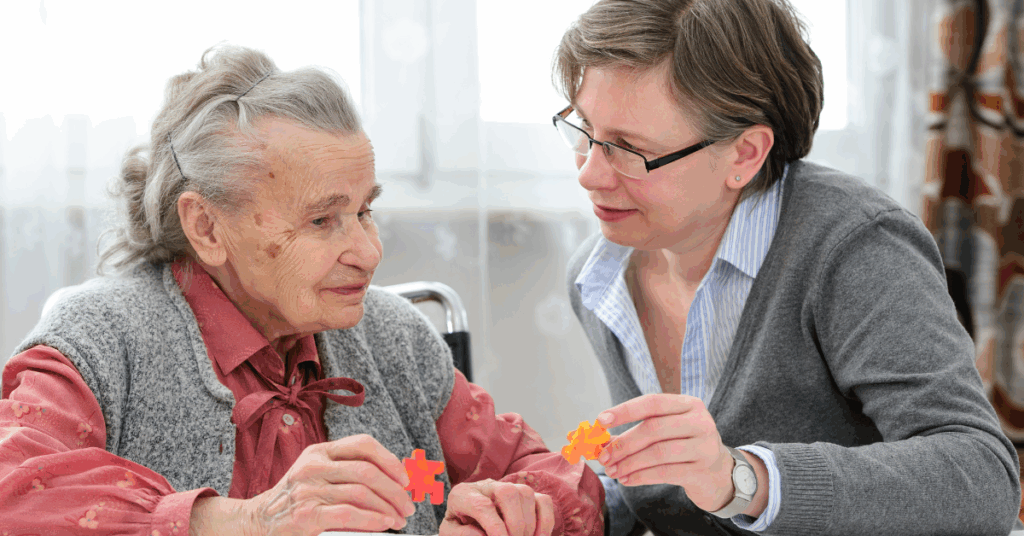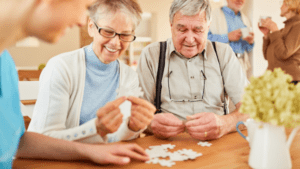Seniors with memory challenges can participate in tailored activities at specialized dementia care in Tacoma, WA. These activities last 15 to 30 minutes, based on their cognitive abilities.
Quality memory care exists in unique communities like Peoples Senior Living. Studies confirm that people with mild dementia can actively participate in complex arts, crafts and cognitive games. Those with moderate to severe symptoms benefit from adapted sensory activities and simple exercises.
The Journey to Finding Quality Dementia Care
Choosing memory care support for a loved one with dementia isn’t easy. Many families start this trip with small changes that become hard to ignore over time. Learning the time to make the move and dealing with mixed feelings are vital steps to giving your loved one the right care.
The move to a memory care community usually happens as care needs grow. Research shows families think about this option after reaching a point where home care just doesn’t work anymore. These signs show specialized memory care might be needed:
- Declining health habits – They forget medications, lose or gain weight significantly or eat poorly
- Behavioral changes – They show more agitation, aggression, mood swings or symptoms that worsen in the evening (sundown syndrome)
- Caregiver burnout – You feel physical stress, emotional exhaustion or your health suffers
Doctors often spot worrying changes before families do. Mental status exams that check concentration, short-term recall and spatial awareness help measure cognitive decline.
Connections Through Memory Care Activities
Taking part in suitable activities together brings joy and might reduce behavioral symptoms. The overall quality of life improves for residents in memory care communities throughout Tacoma, WA.
Simple activities that strengthen bonds despite memory loss
Emotional connections stay strong even as cognitive abilities decline. Research shows that familiar activities create chances for meaningful engagement and help reduce agitation. Here are some simple yet powerful ways to connect:
- Reminisce with photos – Looking through family albums together triggers memories and storytelling, especially from earlier life stages when memory stays better preserved
- Listen to favorite music – Music therapy improves mood, stimulates cognitive function and brings back memories in people with dementia.
- Take part in household tasks – Folding laundry, setting the table or sweeping gives a sense of purpose and familiarity.
On top of that, outdoor activities like short walks in familiar settings or garden visits can be calming while offering gentle stimulation. Physical movement helps promote better sleep and might reduce wandering behaviors.
Creating sensory experiences that trigger positive memories
Sensory stimulation offers powerful ways to reach someone with dementia. Studies show that sensory experiences help people express themselves and bring back pleasant memories.
“Our senses—sight, smell, touch, taste and hearing—play a powerful role in triggering memories,” notes memory care experts at Peoples Senior Living. “For individuals with dementia, these memory cues can be both grounding and comforting.”
Try these multi-sensory approaches:
- Aromatherapy with familiar scents like vanilla or cinnamon
- Tactile experiences like touching different fabrics or sorting objects
- Food-based activities using favorite recipes or flavors
How to participate in activities during visits
Family members can take active part with their loved ones instead of just watching. The community’s activity schedule helps you plan your visits better. Natural opportunities for interaction arise when you join music therapy sessions, art classes or physical exercise periods.
Staff members can suggest ways to take part meaningfully. Many communities welcome families and can recommend appropriate roles based on the resident’s current abilities and interests.
The emotional connection matters more than the outcome of any activity. Research shows that positive feelings experienced at the moment matter more than whether your loved one remembers the activity later.
These meaningful activities at memory care communities like Peoples Senior Living create precious moments of connection that improve your loved one’s quality of life with dementia.
Preserving Identity in Memory Care
Identity preservation stands as the lifeblood of dignified memory care. Quality communities in Peoples Senior Living maintain a person’s sense of self beyond simple care by honoring who they are, whatever cognitive changes occur.
Personalizing your loved one’s living space
A recognizable living environment helps residents feel secure and oriented. You can try these personalization strategies:
- Display meaningful photographs and mementos that trigger positive memories
- Use familiar furniture pieces from home when possible
- Choose contrasting colors for towels, dishware and bedding to boost visibility
- Install clear front cabinets so contents remain visible, reducing confusion
The environment plays a crucial role in how people with dementia feel and function daily. Small touches like placing a beloved chair near a window or adding a favorite blanket provide immense comfort.
Maintaining important routines
Structured routines help people with dementia direct their day with greater confidence. Morning rituals, mealtimes and bedtime routines should match those from home. Research shows that familiar patterns help transfer daily activities into the long-term memory portion of the brain.
Your loved one’s natural rhythm deserves attention. A caregiver put it best: “It’s the present moment that counts… I have to adjust to their rhythm”.
Adapting family traditions for memory care settings
Family traditions create comfort and connection. Smaller, quieter celebrations work best to prevent overstimulation. Your mother’s holiday cookie-baking tradition can transform into decorating premade cookies together.
This experience reminds us that preserving dignity means seeing beyond the diagnosis to the whole person—their history, priorities and unique personality traits stay intact even as memory fades.
Contact our team at Peoples Senior Living to learn more about memory care services and a warm community for your loved one. Call us at (253) 474-1741 and schedule a tour.
FAQs
Q1. How can family members meaningfully connect with loved ones in memory care? Family members can connect through simple activities like looking at photo albums, listening to favorite music or participating in familiar tasks. Engaging in sensory experiences and joining community activities during visits can also strengthen bonds despite memory loss.
Q2. When is it time to consider memory care support? It’s time to consider memory care when health habits decline, behavioral changes occur or caregiver burnout sets in. Nearly all individuals with dementia living at home have unmet needs, indicating that professional care may be beneficial.












